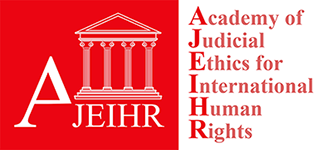Academic Structure
Admission calendar process:
a) Applications are submitted between January 30 – March 30,
b) Admissions results will be communicated between April 10 and April 14,
c) The admitted participants will be able to pay the tuition fee (either full or in five equal installments) between April 30 and August 30.
Duration: Each program is structured during one (1) academic year, from October current year, until May the following year.
Academic year structure: Two (2) semesters, with a winter holiday between them.
Semester 1: October 1 until December 20, followed by winter holidays and first semester examinations.
Semester 2: February until the end of May.
The Semesters consist intensive courses for 5 days per week (Mon – Fri), amounting to 20 hours/week and 80 hours/month.
Examination session:
Starting March 2020 – AJEIHR announces the eligibility conditions for the registration in the Master’s program for the academic year October 1, 2020 – July 31, 2021.
Admission Requirements / Programme / Module Descriptions –
Our course provides law graduates with the opportunity for advanced learning in key areas of courses of modules in advanced international law subjects:
- Judicial Ethics
- Legal Ethics in Emergency Medicine
- Legal Ethics in International Diplomacy
AJEIHR has limited number of 15 places for each programme, totaling a total number of 45 places for the academic year 2020-2021.
Note: The number of participants per academic year will not, under any circumstance, exceed 50.
Teaching Method – Intensive classes, workshops and seminars throughout one year of legal studies.
Tuition Fees 16,000 CHF (Swiss Francs), payable in five (5) installments. This fee includes Academy registration fees, as well as all the materials required for the desired program, library access, graduation fees, and many more.
Fees are payable in interest free installments, however, the Programs are not eligible for Switzerland Postgraduate Loans for Master’s Study.
The fees are for the entire Program of the academic year and includes all the courses as well as supervision for the final dissertation.
Residency costs, such as transport, daily needs and accommodation are not included in these fees. We can also approximate that 2,000 CHF (Swiss Francs) will be required in order to purchase text books and other materials required for the programme you opted for. Furthermore, please note that if you withdraw yourself from the programme during the academic year, reimbursement is not possible.
Applicants Criteria
Practical workshops and effective practice stages will consist of:
– Practical work at the Geneva Justice Court, Swiss Federal Court in Lausanne & Switzerland Cantonal Courts;
– Seminars with UN independent experts and UN rapporteurs ;
– Practical courses with our external collaborators from certain areas of interest, such as medical experts, forensic specialists, civil protection, Red Cross representatives, etc.
In order to complete the Program, the student must pass all the required examinations and also draft and submit a traditional research dissertation paper. – View dissertation requirements here.
Learn in an internationally-orientated environment with access to a global network of like-minded professionals.
Other relevant information
Our master’s programmes are taught by highly experienced academics and practitioners from around the world.
Their priority is to create an intense and dynamic learning environment.
Tutorials given by teaching assistants allow students to revise and discuss key concepts and issues presented during the course.
Guest speakers [ UN ] and external experts [ WHO ] will be regularly invited to share their practical experience and discuss cutting-edge challenges with students.
It is designed for young professionals who want to acquire high-level academic education and real-world practice in the field of in Ethics Judicial, Ethics in Emergency Medicine & Ethics in International Diplomacy (60 ECTS credits) is a one-year postgraduate degree – Geneva – Switzerland
We will collaborate with universities, research centres and (international) organisations located abroad, both inside and outside the EU.
In order to provide our educational services, the AJEIHR is in charge of extensive record keeping on student affairs.
This includes, for example, informing and recruiting prospective students, tailoring our communication and information feeds towards interested prospective students based on their preferences in order to improve their choice of studies and our services, managing internal and external information flows; registering study results; issuing certificates, diplomas, qualifications and degrees; concluding contracts with students; formulating policy on education matters; developing and writing policy and management reports in the context of accreditation demands; being able to provide advice, guidance, and counselling; settling disputes, providing training and education in medical studies; ensuring procedural justice in the election of members for participatory bodies etc.)



